
Cuisine
Algerian cuisine
Algerian cuisine is heavily influenced by its history of colonization and trade. The Berbers, Arabs, French, and Ottomans have all left their mark on the cuisine. Algerian dishes are often made with a combination of spices, including cumin, coriander, paprika, and saffron. Meat, particularly lamb and beef, is a staple in Algerian cuisine. Vegetables such as eggplant, tomatoes, and peppers are also commonly used. Bread is a staple in Algerian cuisine, with many different varieties available. Desserts often feature honey, almonds, and dates.
Typical ingredients
Lamb, Beef, Chicken, Fish, Eggplant, Tomatoes, Peppers, Chickpeas, Lentils, Couscous, Semolina, Bread, Olives, Dates, Almonds, Honey, Mint
Presentation and garnishing
Algerian dishes are often presented on large platters, with the main dish in the center and the sides arranged around it. Garnishes such as fresh herbs and lemon wedges are commonly used. Bread is also an important part of the presentation, with many different varieties available.
The national dish of Algeria is couscous, which is often served with meat and vegetables. Algerian cuisine is also known for its pastries, which are often filled with almonds, honey, and dates.
More cuisines from this region...
Moroccan cuisine, Egyptian cuisine, Tunisian cuisine, Berber cuisine, Libyan cuisine, Sudanese cuisine, Mauritanian cuisine, Western Saharan cuisine
History
Algerian cuisine has a long and complex history. The Berbers were the original inhabitants of Algeria, and their cuisine was based on grains, vegetables, and dairy products. The Arab invasion in the 7th century brought new spices and cooking techniques to the region. The French colonization in the 19th century also had a significant impact on Algerian cuisine, with French dishes and ingredients being incorporated into traditional Algerian dishes.
Cultural significance
Food is an important part of Algerian culture, with meals often being a social event. Many Algerian dishes are served family-style, with everyone sharing from the same platter. Algerian cuisine is also heavily influenced by Islamic dietary laws, with pork being forbidden and halal meat being preferred.
Health benefits and considerations
Algerian cuisine is generally considered to be healthy, with a focus on fresh ingredients and spices. However, some dishes can be high in fat and calories, particularly those made with meat and fried foods. Algerian cuisine is also heavily influenced by Islamic dietary laws, with pork being forbidden and halal meat being preferred.
Algerian cuisine dishes Browse all »
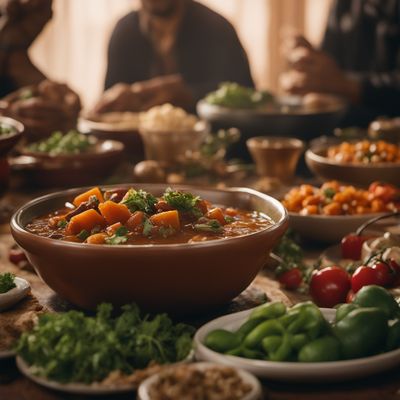
Boutridia
Algerian Vegetable Stew
Boutridia is a traditional Algerian dish made with lamb, vegetables, and a variety of spices. It is a hearty and flavorful dish that is perfect for a cold winter day.

Krichlate
Krichlate is a traditional Algerian cookie that is made with almonds and sesame seeds. These cookies are very easy to make, and they are perfect for serving with tea or coffee.

Kamounia
Bean and sausage stew
Kamounia is a traditional Moroccan dish made with beef and cumin. It is a flavorful and aromatic dish that is perfect for a special occasion.

Zurrukutuna
Bread soup
Zurrukutuna is a traditional Basque soup that is made with bread and garlic. It is a simple and hearty soup that is perfect for cold winter days.
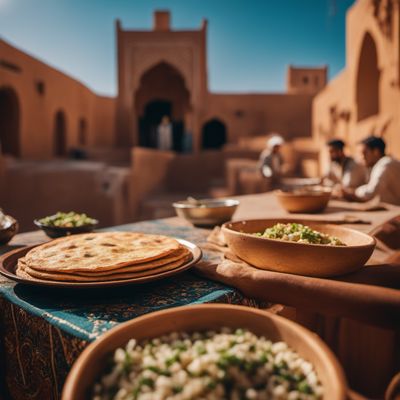
Rougag
Rougag is a traditional Moroccan flatbread that is typically served as a side dish. It is a simple and delicious bread that is perfect for any meal.

Mkatra foutra
Mkatra foutra is a traditional Tunisian dish that is typically served for breakfast or as a snack. It is a type of flatbread that is made with semolina flour and is often...

Khobza medfouna
Khobza medfouna is a traditional Algerian bread that is baked in a wood-fired oven. It is a round, flat bread that is crispy on the outside and soft on the inside. It is often...

Garantita
Garantita is an Algerian dish consisting of a chickpea flour pancake that is fried until crispy.
Algerian cuisine recipes Browse all »

Algerian-inspired Festive Christmas Bread
Saffron-infused Delight: Algerian-inspired Festive Christmas Bread

Algerian-style Spiced Fish Cakes
Savory Algerian Fish Delights: Spiced Fish Cakes with a Twist

Bureek Tajin
Savory Algerian Delight: Bureek Tajin

Almond and Sesame Cookies
Delightful Almond-Sesame Bites: A Nutty Twist on Algerian Krichlate
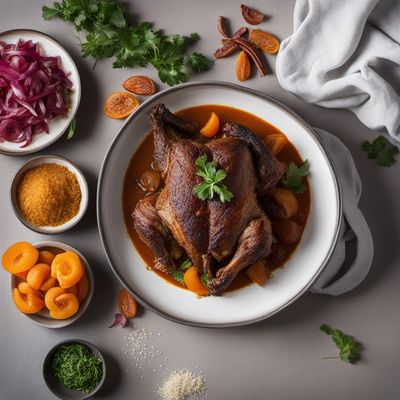
Algerian Spiced Lamb Shoulder with Apricots
Saffron-infused Delight: Algerian Lamb Shoulder with Tangy Apricots
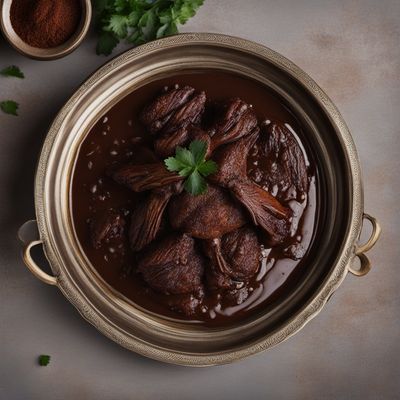
Algerian-style Chocolate Partridge
Savory Partridge Delight with a Touch of Algerian Chocolate

Zurrukutuna - Algerian Spiced Vegetable Stew
Savory Delight: Algerian Zurrukutuna - A Burst of Flavors in Every Bite!

Grilled Pacú with Algerian Spices
Savor the Flavors of Algerian Grilled Pacú

Algerian-style Honey-Spiced Semolina Balls
Deliciously Sweet Semolina Delights: Algerian Gulab Jamun

Zuf with Spiced Lamb and Chickpeas
Savory Delight: Zuf - A Flavorful Algerian Lamb Stew
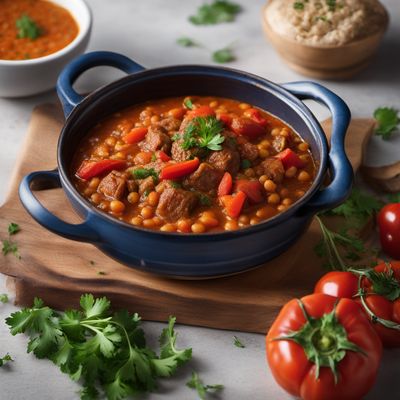
Algerian Loubia Stew
Savory Bean Delight: Algerian Loubia Stew

Algerian Chickpea Pancake
Savory Delight: Algerian Garantita Pancake